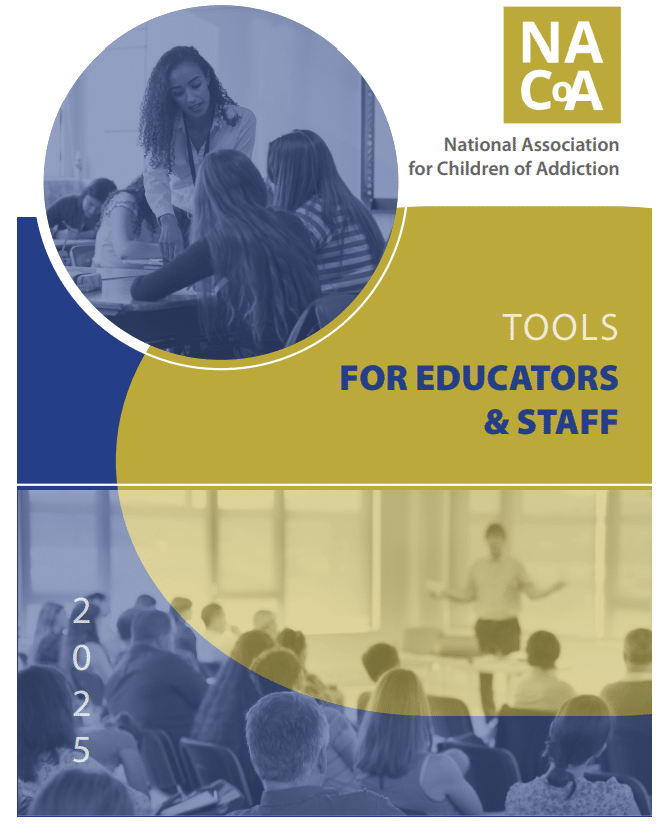CFC #12020
Venmo @NacoaVoice4Children
CFC #12020
Venmo @NacoaVoice4Children

Every member of the learning community is a teacher. They teach by example and they are in a unique position to teach children about healthy relationships by providing the help specific to their role. They are often entrusted with a child’s worries and concerns about their lives outside the school setting. Every member of the school community, at some time, will be called upon to help a child who is experiencing difficulties. Many of these children come to school every day from homes impacted by alcohol or other drug problems. It is the educators who are there every day for children and they are often the ones who come to the aid of children in their care. The following groups of educators have unique opportunities to form relationships with children who need someone to listen and someone to trust.
For years, NACoA has partnered with schools—providing insight, resources, and compassion-driven tools to support children impacted by parental substance use disorders. These children often go unseen, but in truth, 1 in 4 children today is living in the shadow of a parent’s substance use. Further, it is estimated that 1 in 20 students are impacted by FASD (Fetal Alcohol Spectrum Disorders), a group of conditions that can occur in a person who was exposed to alcohol before birth.
NACoA’s Tools for Educators & Staff, a refreshed and expanded version of our renowned Kit for Educators, provides a set of resources designed to deepen understanding, support emotional safety, and empower all caring adults on the school campus to be a safe, supportive adult for children of parental addiction (COAs).

The development of a young child is profoundly influenced by experience. Experiences shape the organization of the brain, which, in turn, influences the emotional, social, cognitive and physiological activities. Insights into this process come from understanding brain development. When our experiences are predictable, moderate and controllable, our brains become stronger, more flexible and develop in ways that make them open for taking in new and novel information. However, if a child’s experiences are frequently uncontrollable, unpredictable, chronic or extreme, the very same neuroplasticity results in changes in the stress-response systems that make them more active, reactive and, over time, highly vulnerable. This webinar recording provides an overview of key principles of neurodevelopment crucial for understanding the role of experience in defining functional and physical organization of the brain. This information will inform further discussion of the educational implications related to a neurodevelopmental approach to child maltreatment and suggest new directions for educational approaches.
At least 25% of the children in your school live in desperate situations and suffer in silence as a result of the chaos and fear brought about by a parental Substance Use Disorder or mental illness, which in turn causes their ability to concentrate and achieve in school to be disrupted. In order that no child “falls through the cracks” Student Assistance Teams use existing staff to systematically identify and assist students in need of various kinds of support and direction. It may be an academic or behavioral problem. It may be the result of a bullying situation. Or it could be an unidentified learning problem. A Student Assistance program creates a faculty and support staff educated in the reality of what impedes a child’s becoming a balanced and productive student, and it provides educational support groups that counter these issues and increases academic achievement and classroom discipline, decreases absenteeism, and produces higher graduation rates – all educational goals.
Faculty teams seek to find the source of a student’s need and move to find the proper services to address their needs, which often are educational support groups specific to their situation. For more information about Student Assistance and support groups, read “Help Is Down the Hall,” a Handbook with an abundance of information about effective strategies to institute and maintain a low-cost program that can be downloaded below and salvage many hurting children and youth in your schools.
Children trust their teachers to educate and inspire, and they often trust teachers with their fears and worries about problems at home. Many children, however, exert great effort to hide the fact that they are struggling with substance use or mental disorders at home. For some, a teacher will be the one who notices that a child’s academic performance has changed and perhaps seems preoccupied. The resources on this page were selected to put tools and information into your hands so that:
The child’s ability to learn and develop may depend upon your knowledge and understanding.
The responsibilities of a school administrator are countless. In addition to the academic and instructional challenges, the maintenance of the behavioral and emotional wellness of the students also falls to you. Children and families with substance use or mental health disorders will often come to your door. The resources included here were chosen with the intention of giving you practical information to help you support your staff as they assist children from families with alcohol or other drug problems and help you offer guidance to parents who may come to you for help. It is hoped that these tools and information will be useful and effective as you interact with students from families with alcohol and other drug abuse problems.
Children trust their teachers to educate and inspire, and they often trust teachers with their fears and worries about problems at home. Many children, however, exert great effort to hide the fact that they are struggling with substance use or mental disorders at home. For some, a teacher will be the one who notices that a child’s academic performance has changed and perhaps seems preoccupied. The resources on this page were selected to put tools and information into your hands so that:
The child’s ability to learn and develop may depend upon your knowledge and understanding.
Children trust their teachers to educate and inspire, and they often trust teachers with their fears and worries about problems at home. Many children, however, exert great effort to hide the fact that they are struggling with substance use or mental disorders at home. For some, a teacher will be the one who notices that a child’s academic performance has changed and perhaps seems preoccupied. The resources on this page were selected to put tools and information into your hands so that:
The child’s ability to learn and develop may depend upon your knowledge and understanding.
Children trust their teachers to educate and inspire, and they often trust teachers with their fears and worries about problems at home. Many children, however, exert great effort to hide the fact that they are struggling with substance use or mental disorders at home. For some, a teacher will be the one who notices that a child’s academic performance has changed and perhaps seems preoccupied. The resources on this page were selected to put tools and information into your hands so that:
The child’s ability to learn and develop may depend upon your knowledge and understanding.
Children trust their teachers to educate and inspire, and they often trust teachers with their fears and worries about problems at home. Many children, however, exert great effort to hide the fact that they are struggling with substance use or mental disorders at home. For some, a teacher will be the one who notices that a child’s academic performance has changed and perhaps seems preoccupied. The resources on this page were selected to put tools and information into your hands so that:
The child’s ability to learn and develop may depend upon your knowledge and understanding.
PTA and other parent organizations intend to advocate for children and provide valuable resources to the learning community. However, the needs of children living in homes with alcohol and other drug problems may remain hidden, even to the caring parent leaders in the school community. The following resources have been selected for the parent leadership in the schools in order to: